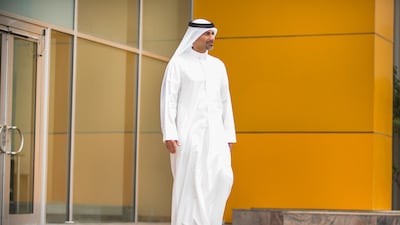Bee’ah, the Middle East’s fastest-growing waste management company, is aiming for double-digit growth in revenues and profits over the next three years as the company expands operations into the Arab world's biggest economy, Saudi Arabia, and targets zero waste headed to landfills.
"We have witnessed double-digit growth in both our revenues and profits in the last five financial years," Khaled Al Huraimel, group chief executive of Sharjah-headquartered public-private firm Bee'ah, told The National.
“Looking at the ongoing projects and expansion plans, we predict the same rate of growth to continue for at least next three years.”
Founded in 2007, Bee’ah - which means "environment" in Arabic - collects over 3 million tonnes of waste annually.
“Saudi Arabia is a huge market … we have recently opened an office there and we will start operations by next year. Right now, we are looking at Riyadh but gradually we will explore opportunities across the Kingdom,” said Mr Huraimel.
Bee’ah has the highest landfill diversion rate in the Middle East, at 76 per cent. This means less than a quarter of waste is going to landfills, while the rest is recycled and reused.
People are understanding that waste is a resource from which you can derive value, income and develop a sustainable business, if treated well, said Mr Huraimel, adding, “We have a successful model in Sharjah and we aim to leverage it in the entire region.”
Bee’ah started a joint venture with Abu Dhabi's Masdar in 2017 and Emirates Waste to-Energy Company, to start generating power from waste. The waste-to-energy plant is under construction in Sharjah and is being heralded as a turning point in the UAE’s efforts to reduce waste. Bee'ah has only disclosed the financing loan amount of $220 million (Dh808m) while the exact value of the project is much higher.
The waste-to-energy plant will generate close to 30 megawatts of energy by burning up to 37.5 tonnes of rubbish an hour, generating steam to be used to power generators, which will in turn provide electricity to the Sharjah Electricity and Water Authority.
“By 2021, our waste-to-energy facility will be fully operational and we will have zero waste going to the landfill [in Sharjah]. We secured the full financing for the project at the end of last year,” said Mr Huraimel.
Bee’ah is also working on generating energy from other renewable resources such as solar.
Mr Huraimel said by 2021, Bee’ah aims to produce close to 100MW of power (roughly enough to power 10,000 homes at once) through waste and solar energy.
Bee’ah's fleet consists of over 1,200 collection vehicles and the company is using digital tools to track the fleet and optimise routing through the internet of things.
“Some of our waste bins have sensors that communicate directly with the control room, alerting vehicles for collection.”
To diversify its operations further through digitalisation, Bee’ah set up a company, EvoTeq, in 2017 to pursue digital ventures. Working with the UAE Ministry of Health, it co-developed a medicine trace-and-track platform in collaboration with IBM and SAP. This technology platform will be launched in the UAE "soon", Mr Huraimel said.
“It is an advanced product to track medicines and eliminate the problem of counterfeit medicines, illegal transactions and shortage of drugs. Right from the manufacturer to the end patient, anybody can track the medicine using a mobile application and the ministry will have all the records.”


